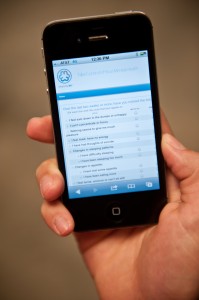New technology has allowed smartphone apps to track calories, translate languages and even take professional-looking photos. Now a new app can also test for mental health conditions, assisting in both treatment and reducing costs.
WhatsMyM3 is the app that screens for signs of depression, anxiety, bipolar disorder and post-traumatic stress disorder. Through a series of questions, the app assesses the user’s mental condition. The results come as an overall score and four sub scores, one for each conditions.
Gerald Hurowitz, MD Chief Medical Officer for WhatsMyM3, explains that the number given from the test is important in assessing one’s mental condition. Just as high cholesterol numbers indicate a higher risk for heart attack and stroke, M3 scores can indicate risk for developing various mental conditions.
“The number is a starting point to assess any mood or anxiety disorder,” said Hurowitz. “It is not a black and white answer to if you have the disorder or not; the responses need to be put into context. It is up to the clinician to humanize the results instead of being diagnosed by robots.”

“It prompts to help organize symptoms,” Byer said.
Henry Acosta, patient and advocate of M3, says that prompting him to fix the problem is just what M3 did.
“I was trying my best to keep it all together,” Acosta said. “I hadn’t been in the psychiatric hospital since I was 16 years old. A few months ago I literally felt like (returning to the hospital) may have been an option, but I didn’t want to ruin everything that was going on; I couldn’t afford it. I thought ‘this will pass, this will pass, just deal with it.'”
He said he took the M3 test, and his thoughts that he may have depression were confirmed. He scored high in areas of depression and suicide risk.
“That propelled me to pick up the phone and get back into treatment,” said Acosta. “Since then it really helped change the course of my life.”
As a device of early detection, this can be beneficial for those not mentally afflicted, Dr. Hurowitz said. He also says this can be very helpful for students.
“Sometimes college people think it romantic to be depressed or angry, and sometimes those feelings are appropriate,” the medical professional said. “Sometimes young adults lose sight of the fact that emotions can have an impact on actions.”
When negative feelings overtake the person and begin interfering with functions, the body gets worn down and can worsen conditions. Because the app tracks scores, people can assess their mental state over time and visit a clinician if necessary, Hurowitz said.
Dr. Hurowitz and others believe this could also reduce health care costs. According to the news release, mood disorders that are not treated cost more than $70 billion each year. Detecting and acting on mood disorders early can help reduce the costs for the patients.
M3 can increase efficiency of health care and help people who would not otherwise reach out, Hurowitz said.




